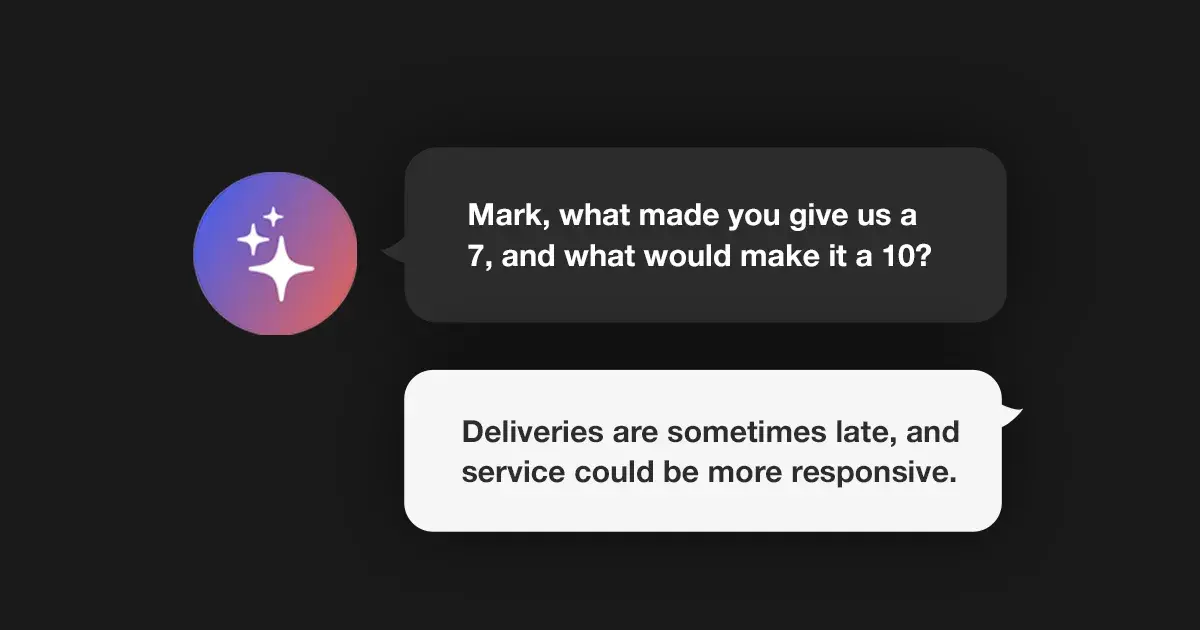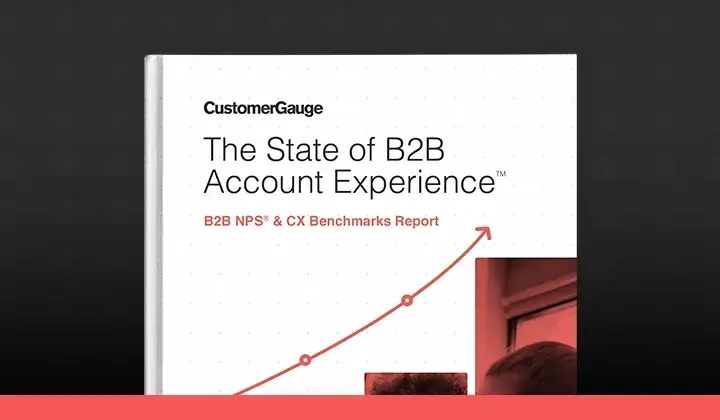If you landed on this article, you’re likely aware that manufacturing is evolving due to technological advancements, changing consumer demands, and global economic factors.
And as a professional in this industry that will inevitably face these changes, what are the steps to overcome them? Or even better, get ahead of them before they have time to affect the business.
👉 To keep a finger on the pulse (and outsmart the competition, of course) a customer experience (CX) program is the solution you’ve been glossing over all along, and we’ll tell you why.
Our customer, Engro Polymer and Chemicals Ltd., is the sole chemical manufacturer of polyvinyl chloride (PVC) resin in Pakistan and discovered the impact incredible CX can make on a company — quickly.
The business has an opportunity to become a globally competitive PVC producer, and they are well on their way by leveraging their (now) world-class Account Experience (AX) program.
As a result of leveraging real-time customer feedback, Engro has increased the top-line growth of the organization by 17% as a direct result of their Net Promoter Score (NPS) program and received many other achievements!
Today we’ll share the trends and challenges anticipated for 2025 that companies like your own are expected to face and how focusing on exceptional CX can play a pivotal role in overcoming them.
Manufacturing Trends
Although it may sound obvious, manufacturers can no longer ignore current trends to stay competitive in this evolving industry.
Technological advancements such as artificial intelligence (AI) are already making waves this year. And we’ve seen time and time again that businesses that do not adapt to the new digital agenda will quickly fall behind the competition.
As we look at 2025, several key trends are going to impact the industry:
Digital transformation (especially in supply chain processes). While the manufacturing sector reaps tons of benefits from digital transformation, it also faces heightened cybersecurity risks. Recent research reveals that over half of surveyed manufacturing firms have fallen victim to ransomware attacks, with nearly 70% experiencing malicious data encryption.
To counteract these cyber threats, it is imperative for manufacturers embarking on digital transformation initiatives to prioritize cybersecurity alongside these projects. Especially to safeguard customer data to preserve customer trust and loyalty throughout their experience.
We’re now seeing manufacturers reinforcing cybersecurity measures to protect sensitive information, instilling in customers confidence and assurance of the integrity of their products and services.
Aftermarket services. In recent years, manufacturers have rapidly adopted advanced technologies to enhance their products. These include IoT sensors, onboard computers, machine learning capabilities, embedded radio frequency identification tracking, and more. These advancements highlight the significance of comprehensive aftermarket support and the opportunities it presents.
A strong aftermarket presence enables manufacturers to engage more closely with customers, gaining insights into their specific needs and preferences. By bundling services, manufacturers can scale their service strategies, unlocking additional revenue streams.
Sustainability initiatives. ESG (Environmental, Social and Governance) is leading the industry to adopt more environmentally friendly manufacturing processes, such as waste reduction, energy efficiency improvements, and the use of eco-friendly materials, to meet increasing consumer demand for sustainability.
These sustainable manufacturing practices align with the growing consumer demand for eco-friendly products and contribute to broader environmental goals such as reducing carbon emissions and combating climate change. By embracing sustainability, manufacturers fulfill their corporate social responsibility.
Additionally, they position themselves for long-term success in a world where customers increasingly value environmental initiatives.
Manufacturing Challenges
As we mentioned at the start, it’s not uncommon for companies to overlook just how critical a strong customer experience program can be to their long-term success.
Our team has worked with many businesses — we’re talking 100+ Consumer Packaged Goods (CPG) brands, that discovered after partnering with us that CX is their golden ticket to overcoming challenges and predicting them before they take full effect.
Before we get into the nitty-gritty of the importance of customer experience in manufacturing, let’s cover the obstacles you can expect to see more of in 2024.
1. Supply Chain Disruptions
Industry professionals know that disruptions in the global supply chain have been persistent.
From natural disasters to trade disputes, these factors have led to delays in production, shortages of raw materials, and increased costs.
By proactively communicating with customers about potential delays or shortages, manufacturers can manage expectations and minimize dissatisfaction. Plus, by diversifying sourcing options and maintaining transparent communication channels, manufacturers can ensure a smoother experience for customers, even in the face of these ongoing supply chain challenges.
2. Skilled Labor Shortages
The ongoing shortage of skilled workers, including engineers and technicians, poses challenges for manufacturers seeking to fill critical roles and maintain productivity levels amid technological changes.
Investing in customer experience extends well beyond the end product to the service provided by skilled workers. Manufacturers can enhance their customer experience by prioritizing workforce development and training programs (similar to our CustomerGauge Academy 👀) to address skill gaps.
By empowering employees with the necessary knowledge, manufacturers can improve the quality of products and services, ultimately leading to higher customer satisfaction.
With data found using CustomerGauge, Wajax now communicates consistent service expectations and enhances their internal team's technical knowledge and skills to differentiate themselves around their most important driver of customer satisfaction: their employees.
3. Cybersecurity Threats
With increased digitization in manufacturing processes, the industry becomes more susceptible to cyber threats such as data breaches, ransomware attacks, and intellectual property theft, requiring cybersecurity measures to safeguard sensitive information.
By transparently communicating security measures to customers, manufacturers can reassure them of the company's commitment to protecting their information, thereby enhancing the overall customer experience and building trust.
4. Poor Communication Among B2B Touchpoints
Effective communication in the workplace is crucial, especially in manufacturing operations.
Without clear communication channels between B2B touchpoints can lead to misunderstandings or errors in process specifications. This may result in incorrect or incomplete orders being processed, causing delays, rework, and ultimately, dissatisfied customers.
B2B customers expect timely and transparent communication throughout the order fulfillment process. Without it, customers begin to lose trust in manufacturers, leading to dissatisfaction and potentially damaging long-term relationships.
Effective communication with B2B customers is essential for manufacturing businesses to streamline operations, enhance customer satisfaction, maintain competitiveness, and sustain success in the marketplace.
Importance of CX in Manufacturing
A manufacturing CX program is not just a nice to have; it's a strategic imperative.
It helps manufacturers stay competitive, build brand loyalty, reduce costs, and foster innovation. If the B2B customer isn’t at the heart of all operations, it will be much more difficult to scale the business.
As Muhammad Idrees, Chief Commercial Officer at Engro Polymer and Chemicals Ltd. says, "You've got to believe that if you want to be successful, you will have to work on your customer success. Because their success is your success."
More on their CX achievements below 👇
Quality Control and Assurance Starts With the Customer
How can you accurately assess just how well your operations are doing without listening to your B2B customers throughout the process?
The answer: you can’t.
With how competitive the market is today, customer experience is now the driving force behind sustained growth and success. To seriously thrive in this environment, organizations must adopt methodologies that collect and analyze customer feedback effectively.
Let’s take our customer Engro Polymer and Chemicals Ltd. for example.
Just a few years after working with our Account Experience (AX) software and methodology, Engro had a world-class program in their hands.
This is because they started taking a deep dive into metrics like NPS, response rate, closing the loop, and more.
Their results? Nothing short of incredible. Since making the effort to listen to what their B2B customers were saying about their business, they have achieved:
The AX Award for their 99% account response rate two years in a row
A near 100% contact response rate
16% increase in NPS improving from 64 to 84
8% increase in closed-loop rate
and a 17% increase in the top-line growth of the organization as a direct result of their NPS program!
Gain a Competitive Advantage Through Real-Time Feedback
By monitoring NPS and addressing issues raised by customers, manufacturing companies can improve customer satisfaction, attract new customers, and retain existing ones — AKA an improvement in your bottom line.
However, manufacturing leaders like Engro don’t get ahead by monitoring customer experience metrics only now and then.
This type of data must be continuously gathered to understand what works and what doesn’t on an ongoing basis.
“Always-on” feedback enables manufacturers to listen to customers all while scaling faster than the competition.
Engro’s World-Class CX Program Attributed to a 17% Increase in Top-Line of Organization
Engro Polymer and Chemicals Ltd. was founded as a fertilizer business in 1965 and has since grown into the sole chemical manufacturer of polyvinyl chloride (PVC) resin in Pakistan.
A subsidiary of Engro Corporation with over 2,600 employees, they are one of Pakistan’s largest and most diversified conglomerates.
Their vision is to become a globally competitive PVC producer and they are well on their way — how?
Through their exceptional customer experience efforts.
The business has had customer-centricity rooted in its culture since the beginning, continuously proud to see customers succeed. However, they wanted a more formal CX program to start digging into their customer’s feedback.
CustomerGauge Co-Founder and CEO, Adam Dorrell, recently welcomed Muhammad Idrees to The Account Experience Podcast.
Muhammed explained,
"We started using CustomerGauge [to measure] the NPS score. It provided us with a methodical sort of platform to seek feedback from customers. And customers [also understand] that this is one of the most effective and meaningful ways of giving feedback."
Receiving customer feedback was extremely important to Engro when they first began, however, they quickly learned the importance of closing the loop on it as well.
Muhammad added that once you start building trust with your customers, the relationship you have with them only continues to get better and beneficial to the business.
💡 Feeling inspired? Continue reading Engro Polymer and Chemicals Ltd.'s full customer experience program journey here.
Tackle Manufacturing Challenges in 2025 With CustomerGauge
It’s time to start facing industry-wide challenges proactively, not reactively.
Businesses that prioritize customer satisfaction and invest in the right technology will lead the way, setting new Manufacturing standards for excellence and success.
Don’t wait — reach out to our team for an Account Experience demo!




